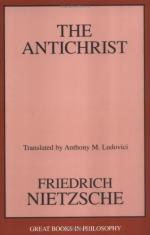|
This section contains 7,472 words (approx. 25 pages at 300 words per page) |

|
Dictionary of Literary Biography on Friedrich (Wilhelm) Nietzsche
Virtually unknown and ignored during his productive life, Friedrich Nietzsche lapsed into insanity in the first days of 1889 and only glimpsed the beginning of his rapid ascent to fame and controversy throughout the world. By 1900 Nietzsche's thoughts were resonating in the works of George Bernard Shaw, Hugo von Hofmannsthal, August Strindberg, and Thomas Mann. The writer who advocated bringing "Heroismus in die Erkenntnis" (heroism into knowledge) waged spirited campaigns against intellectual smugness, metaphysics, Christianity, romanticism, nationalism, idealism, and a host of modern society's chief ills. Nietzsche earned the distinction of being history's most eloquent wielder of the anti while, paradoxically, serving as a champion of life-affirmation. To a greater extent than any predecessor Nietzsche elevated philosophical expression to an art. His approach to issues was influenced by comparisons between ancients and moderns; his overriding concern for the condition of the modern individual, forced to come to terms with...
|
This section contains 7,472 words (approx. 25 pages at 300 words per page) |

|


